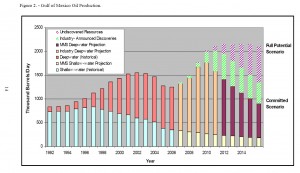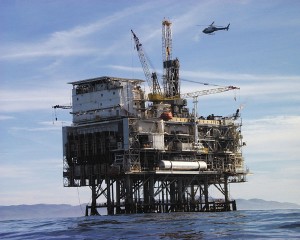The U.S. consumes about an almost unimaginable amount of oil every day: 20,680,000 barrels of oil per day (and see here). Keep in mind that each barrel contains 42 gallons. Thus, Americans currently use 20,680,000 barrels per day = 239 barrels per second = 10,000 gallons of oil per second.Therefore , we desperately need to maintain almost 4,000 drilling platforms in the Gulf of Mexico in order to keep drilling for oil, right? Not so fast.
Why aren’t we seriously discussing our ability to entirely eliminate offshore drilling by getting just a little bit serious about conservation? Consider the following statistics, which should be on the front page of every newspaper in the United States because

they prove that we don’t need offshore drilling but that we do need to seriously implement conservation measures for many reasons (one of which is impending peak oil):
Projecting ahead to the year 2016, the total oil production from the Gulf of Mexico will never exceed 2.1 million barrels of oil per day. Within the next 10 years, total GOM oil production is expected to exceed 1.7 million barrels of oil per day (MMBOPD), a projection based on existing shallow and deepwater operator commitments as shown in Table 2 and Figure 2. If industry-announced discoveries and undiscovered resources realize their full potential, production could reach 2.1 MMBOPD.
This information comes from page 12 of “Gulf of Mexico Oil and Gas Production Forecast: 2007-2016,” published by the U.S. Department of the Interior. See also, this chart, Figure 2 on page 14 of this same report:

But is it even possible to conserve anything near 2.1 million barrels of oil per day in the United States? Yes, easily.
In August, 2008, Joseph Romm assembled some eye-popping calculations in a Grist article titled “More oil can be found in your car than offshore.” Based on conservative estimates, “the nation could save some 2.5 to 3 million barrels a day through better automotive maintenance and smarter driving.” Note that Romm’s conservatively calculated measures would save more barrels of oil every day than the barrels we suck out of the Gulf of Mexico.
The suggestions in the Grist article do NOT even include upgrading the U.S. fleet to including more fuel efficient vehicles. Rather, the Grist article includes only the following common sense suggestions and calculations:
• Keep Your Engine Properly Tuned: (can improve mileage by as much as 40 percent).

• Check & Replace Air Filters Regularly: Replacing clogged air filter can improve your car’s gas mileage by as much as 10 percent.
• Keep Tires Properly Inflated: You can improve your gas mileage by around 3.3 percent. (I was an early advocate of this point).
• Use the Recommended Grade of Motor Oil (This can improve your gas mileage by 1-2 percent).
• Drive Sensibly: (aggressive driving can lower your gas mileage by 33 percent at highway speeds and by 5 percent around town.)
• Observe the Speed Limit. (This can increase mileage 7-23%.)
• Remove Excess Weight (“An extra 100 pounds in your vehicle could reduce your MPG by up to 2%”).
But what if we got even more serious about conserving oil? One such analysis is the “EPA Analysis of the Transportation Sector,” published on Feb 10, 2010. These suggestions include upgrading the design of motor vehicles and fuels, as well as implementing public transportation, land-use, ride-sharing, and other innovations. Adopting these proposals could save an additional 4.2 million barrels of oil per day, which is double the amount of oil that petroleum companies currently extract, per day, from the Gulf of Mexico.
Conservation measures are thus immensely important, and they directly benefit the immense expenditures we make regarding national security, since not-needed oil doesn’t flow through any pipeline at all, and it doesn’t require the American military to supervise its non-flow through non-pipelines.
Being smart is a lot easier than finding unnecessary oil. To conserve oil does require political will. Despite hostile attitudes against conservation by those ironically named “conservatives” (and see here), we have occasionally enacted meaningful changes. Consider, that on May 19, 2009, President Obama:
Set in motion a new national policy aimed at both increasing fuel economy and reducing greenhouse gas pollution for all new cars and trucks sold in the United States. The new standards, covering model years 2012-2016, and ultimately requiring an average fuel economy standard of 35.5 mpg in 2016, are projected to save 1.8 billion barrels of oil over the life of the program with a fuel economy gain averaging more than 5 percent per year and a reduction of approximately 900 million metric tons in greenhouse gas emissions. This would surpass the CAFE law passed by Congress in 2007 required an average fuel economy of 35 mpg in 2020.
To summarize, merely upgrading those five model years of motor vehicles will eliminate 1.8 billion barrels of oil over the lifetime of those vehicles regulated. I don’t have exact numbers regarding life of the typical car, but we can estimate it to be about ten years, Based on that number 1.8 billion over ten years, simply making five years of passenger vehicles a bit more efficient will save 500,000 barrels of oil per day, which is about one-fourth of all of the oil produced by all of the off-shore drilling in the Gulf of Mexico.
We’ve conserved immense amounts of oil through government measures that barely scratch the surface. It’s time to get really serious about saving oil through improved measures in the conservation sector. And then we need to get doubly serious about building zero carbon footprint buildings, because each such building will be around wasting fuel (or saving fuel) for decades longer than the life of a typical car.
We should immediately to take the tragic devastation in the Gulf of Mexico caused by British Petroleum as a wake-up call to get serious about conservation. This call should be sounded from every quarter, because the United States is a bloated and thus vulnerable energy hog. Conservation will need to become the centrepiece for our national energy policy. We can either have the courage to face this inconvenient fact, or it will be shoved down our throats. Here are some useful ideas for getting started (and see here).


Rocky Mountain Institute is one of the few voices willing the hammer the connection between our wasteful energy usage and the oil spill disaster in the Gulf of Mexico. http://www.rmi.org/rmi/Moving+Past+Oil+Best+Oppor…
I responded to the above article with this comment:
Thank you for boldly making the connection between our profligate use (and waste) of energy and the Gulf of Mexico disaster. The U.S. consumes about an almost unimaginable 20,680,000 barrels of oil per day. http://tonto.eia.doe.gov/dnav/pet/pet_cons_psup_d… A bit of math shows this to be 239 barrels per second, which equates to almost 10,000 gallons of oil per second. Based on these sorts of numbers, many Americans have come to believe something like this: Of course we need to keep maintaining 4,000 drilling platforms in the Gulf of Mexico in order to keep drilling for oil.
There are immensely better ways to obtain the energy we truly need to maintain a first-rate and sustainable lifestyle, however. We could eliminate the need for all of the offshore oil drilling merely by undertaking modest energy conservation measures. I recently pointed out some of these opportunities here: http://dangerousintersection.org/2010/05/15/conse…
As you repeatedly stress in your publications, many methods of dramatically conserving energy are relatively painless and, in fact, financially profitable. If only the media and our politicians would take the time to understand. Too many of them are too prone to push back against meaningful conservation measures because living an energy-conscious lifestyle is too often portrayed to be an attack on the American way of life. They tend to think of conservation as a matter of endless sacrifice rather than as an incredible opportunity.
Keep up the great work you have done educating all of us. Weaning ourselves from fossil fuels is a terrific social, health and economic opportunity, and we need to keep being reminded of the upside of energy conservation.
Erich Vieth
"President Barack Obama on Friday mandated a new national policy on cutting greenhouse-gas emissions and increasing fuel efficiency for pollution-spewing trucks. Obama signed a memorandum that also expanded his effort to make cars more environmentally friendly, and stipulated new efforts to develop advanced vehicles, including electric cars, the White House said."
http://www.grist.org/article/2010-05-21-obama-unv…
Bernie Sanders gets it. http://www.guardian.co.uk/commentisfree/cifameric…
The BP disaster is worrying many in the oil industry, as reported by Reuters. Everyone else is worried about the lives lost, the environmental impact, etc…, but the energy executives profiled are worried that this will be the incident that causes Americans to demand renewable energy:
Brynn: I'd like to think that this incident in the Gulf will make us look seriously at conservation as a powerful "source" of energy, but I am repeatedly annoyed by well-educated Americans who clearly indicate to me that:
1. "They" will figure it out and we will always have plenty of energy;
2. They have no intention of doing anything serious to change their lifestyle.
I'm waiting and waiting for a groundswell, but I hear and feel nothing. I figure that Americans would rather embrace yet another round of short-sighted and dangerous energy production than do things like push up their thermostat this summer, or even open the windows. There's no connection between the ruined beaches and our waste of energy that is obvious enough, but it obvious to anyone who cares. It's like the lack of connection between over-eating and becoming obese. "How did I get so fat?" people often bemoan.
Erich:
I agree with you, much as I wished I could point to something that proved otherwise.
I'm very disappointed in President Obama who declared "I am the president and the buck stops with me", only to start his vacation promptly at the close of business Friday.
I'm well aware that there's nothing more he could be doing right now, but I just wish he would admit that.
For those who can read between the lines, President Obama is now sounding the alarm about peak oil. Here's his explanation for peak oil, from his press conference transcript (if you'd rather watch the video, begin around the 49:30 mark):
By "on the horizon" of course, he really means right on top of us. Listening to President Obama, it's apparent that this is what spin sounds like at the end of the oil age.
Brynn: Good catch.
As you have often pointed out, "peak oil" doesn't mean that we're almost out of oil; it means that the price is about to shoot up because all the easy oil is already burned. That sounds to be exactly the topic Obama was addressing.
The next necessary step on our political drama is to start calling it "peak oil." Better sooner than later that a major politician starts the conversation we all need to have using the right term. Only once "peak oil" becomes well understood and acknowledged, can we pull dangerous buffoons like Sarah Palin off the national stage. I'm afraid that necessity isn't the mother of invention regarding our current predicament, because of people like Palin. There are far too many people in denial. Once we start actually making widespread use of the term "peak oil," even those afflicted with innumeracy might get it. Maybe fear can be the mother of invention. Whatever it takes to soften what is shaping up to be a tumultuous transition.
Leaders from Friends of the Earth, Public Citizen, and 350.org have increased the tenor of their advocacy by prodding members of Congress and coordinating grassroots events to reach Obama and congressional Democrats. Jackie Savitz—a senior scientist with Oceana, an ocean-advocacy group primarily concerned with climate change's effect on acidification—says that the group is "angry" that Obama hasn't stepped up in a more decisive way.
http://www.newsweek.com/2010/06/24/environmental-…